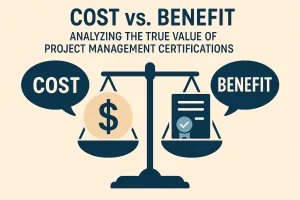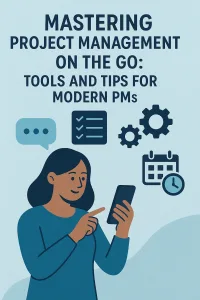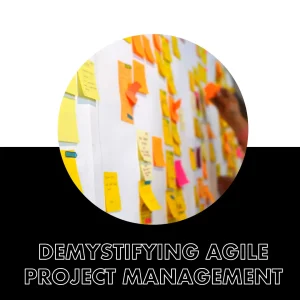Introduction
The Project Management Professional (PMP) certification stands as a hallmark of excellence and expertise. Administered by the Project Management Institute (PMI), this globally recognized credential signifies that an individual possesses the knowledge, skills, and experience necessary to lead and direct projects effectively. For newly certified PMPs, this certification not only enhances their professional credibility but also opens doors to a myriad of networking opportunities that can significantly impact their careers.
Networking is a crucial element in the project management landscape. It allows professionals to connect with peers, share insights, and collaborate on best practices. For newly minted PMPs, building a robust professional network can lead to mentorship opportunities, job referrals, and partnerships that can propel their careers forward. Engaging with other project management professionals can also provide access to industry trends, resources, and support systems that are invaluable in navigating the complexities of project management.
In this blog post, we will explore the various networking opportunities available to newly certified PMPs. We will discuss how to leverage professional associations, attend industry conferences, and utilize online platforms to connect with fellow project managers. Additionally, we will highlight the importance of maintaining these connections and how they can lead to career advancement and personal growth in the field of project management. By understanding the significance of networking and actively engaging with the project management community, newly certified PMPs can maximize the benefits of their certification and enhance their professional journey.
Understanding the Value of Networking
Networking is an essential component of professional growth, particularly in the field of project management. For newly certified Project Management Professionals (PMPs), leveraging networking opportunities can significantly enhance career prospects and foster meaningful connections within the industry. Here are some key points that illustrate the importance of networking for PMPs:
Benefits of Networking
- Access to Job Opportunities: Networking opens doors to job opportunities that may not be advertised publicly. Many positions are filled through referrals and personal connections, making it crucial for PMPs to engage with their peers and industry professionals. According to a survey by LinkedIn, 85% of jobs are filled through networking, highlighting its importance in career advancement.
- Mentorship: Establishing a network allows newly certified PMPs to connect with experienced professionals who can provide guidance and mentorship. Mentors can share valuable insights, offer advice on navigating challenges, and help mentees develop their skills and confidence in project management.
- Knowledge Sharing: Networking facilitates the exchange of ideas and best practices among project managers. Engaging with others in the field can lead to discussions about innovative methodologies, tools, and techniques that can enhance project outcomes. This collaborative environment fosters continuous learning and professional development.
Collaborations and Partnerships
Networking can also lead to fruitful collaborations and partnerships in project management. By connecting with other PMPs, professionals can identify opportunities to work together on projects, share resources, and combine expertise to achieve common goals. Collaborative efforts can result in more successful project outcomes and can enhance the reputation of all parties involved.
- Joint Ventures: Many successful projects arise from partnerships formed through networking. For instance, a PMP might meet a fellow project manager at a conference and later collaborate on a large-scale project, combining their skills and resources to deliver exceptional results.
- Cross-Industry Collaborations: Networking can also facilitate connections across different industries, allowing PMPs to bring diverse perspectives and approaches to their projects. This cross-pollination of ideas can lead to innovative solutions and improved project performance.
Statistics and Anecdotes
Numerous studies and anecdotes underscore the impact of networking on career success for PMPs. For example, a report from the Project Management Institute (PMI) indicates that professionals who actively network are more likely to receive promotions and salary increases compared to those who do not.
Additionally, many successful PMPs attribute their career advancements to the relationships they built through networking. One PMP shared that attending industry conferences and engaging with peers led to a pivotal job offer that significantly advanced their career trajectory. Such stories highlight the tangible benefits of networking in the project management field.
Leveraging Your PMP Certification in Networking
Obtaining a Project Management Professional (PMP) certification is a significant achievement that not only enhances your skills but also opens up a myriad of networking opportunities. For newly certified PMPs, leveraging this credential can be instrumental in building a robust professional network. Here are some key points illustrating how PMP certification can enhance your networking prospects:
- Credibility and Recognition: The PMP certification is globally recognized and respected in the field of project management. It signifies that you possess the knowledge, skills, and experience necessary to lead and direct projects. This credibility can make you more appealing to potential connections, as it demonstrates your commitment to the profession and adherence to industry standards. When you introduce yourself as a PMP, it often leads to immediate respect and recognition from peers and industry leaders alike, facilitating more meaningful conversations and connections.
- Conversation Starter: At networking events, the PMP certification serves as an excellent conversation starter. Many professionals in the project management field are familiar with the certification and its rigorous requirements. This common ground can help break the ice and lead to discussions about project management methodologies, challenges faced in the industry, and best practices. Sharing your experiences as a PMP can spark interest and encourage others to engage with you, creating opportunities for collaboration and knowledge exchange.
- Shared Language and Framework: One of the most significant advantages of having a PMP certification is the shared language and framework it provides. PMPs are trained in standardized project management practices, tools, and terminologies, which fosters a common understanding among certified professionals. This shared knowledge base allows for deeper connections, as you can discuss specific methodologies, such as Agile or Waterfall, and relate to each other’s experiences in managing projects. Engaging in conversations that utilize this common framework can lead to stronger relationships and potential partnerships in future projects.
Effective Networking Strategies for New PMPs
As a newly certified Project Management Professional (PMP), you have taken a significant step in advancing your career. One of the most valuable aspects of obtaining your PMP certification is the opportunity to expand your professional network. Building connections with peers and industry leaders can open doors to new opportunities, collaborations, and insights. Here are some actionable tips to help you effectively network as a new PMP:
- Attend Project Management Conferences and Workshops: Participating in industry conferences and workshops is an excellent way to meet professionals who share your interests and challenges. These events often feature keynote speakers, panel discussions, and networking sessions that allow you to engage with experienced project managers and learn from their experiences. Look for events hosted by reputable organizations, such as the Project Management Institute (PMI), to maximize your exposure to industry trends and best practices.
- Join Local or Online Project Management Groups and Associations: Becoming a member of local PMI chapters or other project management associations can provide you with access to a community of professionals. These groups often host regular meetings, seminars, and networking events where you can connect with fellow PMPs. Additionally, online platforms like PMI’s online community or other project management forums can help you engage with a broader audience, share knowledge, and seek advice from experienced practitioners.
- Utilize Social Media Platforms Like LinkedIn: LinkedIn is a powerful tool for professional networking. As a new PMP, you should create a comprehensive profile that highlights your certification, skills, and experiences. Connect with other PMPs, industry leaders, and colleagues to expand your network. Engage with their content by liking, commenting, and sharing insights to foster relationships. Joining LinkedIn groups focused on project management can also provide opportunities to participate in discussions and connect with like-minded professionals.
- Engage in Online Forums and Discussion Groups: Participating in online forums and discussion groups related to project management can enhance your networking efforts. Websites like Reddit, ProjectManagement.com, and specialized forums allow you to ask questions, share experiences, and learn from others in the field. Engaging in these communities not only helps you build connections but also positions you as an active participant in the project management discourse.
By implementing these strategies, newly certified PMPs can effectively expand their professional networks, gain valuable insights, and enhance their career prospects in the field of project management. Networking is not just about making connections; it’s about building relationships that can support your professional growth and development.
Building Relationships: Tips for Meaningful Connections
Achieving a Project Management Professional (PMP) certification is a significant milestone that not only enhances your skills but also opens up a plethora of networking opportunities. For newly certified PMPs, building a robust professional network is essential for career growth and development. Here are some key strategies to cultivate meaningful relationships rather than merely accumulating contacts.
1. Emphasize the Importance of Follow-Up
After meeting someone at a networking event or professional gathering, the initial connection is just the beginning. Following up is crucial to solidifying that relationship. Here are some effective follow-up strategies:
- Send a Personalized Message: Within a few days of your meeting, send a brief email or message thanking them for their time and referencing a specific topic you discussed. This shows that you value the conversation and are genuinely interested in maintaining the connection.
- Connect on Social Media: Platforms like LinkedIn are excellent for professional networking. Send a connection request with a personalized note to remind them of your meeting and express your desire to stay in touch.
- Schedule a Coffee Chat: If appropriate, suggest a casual meeting over coffee or a virtual chat to discuss shared interests or projects. This can deepen your relationship and provide opportunities for collaboration.
2. Maintain Relationships Through Regular Communication
Building a network is not a one-time effort; it requires ongoing communication. Here are some ways to keep the lines of communication open:
- Regular Check-Ins: Set reminders to reach out to your contacts periodically. A simple message asking how they are doing or sharing an article relevant to their interests can keep the relationship alive.
- Share Updates: Keep your network informed about your professional journey, such as new projects, achievements, or insights from your PMP experience. This not only keeps you on their radar but also encourages them to share their updates with you.
- Engage in Collaborative Projects: Look for opportunities to work together on projects or initiatives. Collaboration fosters deeper connections and allows you to learn from each other’s expertise.
3. Encourage Sharing Knowledge and Resources
One of the most effective ways to strengthen connections is through the exchange of knowledge and resources. Here’s how to facilitate this:
- Host Knowledge-Sharing Sessions: Organize informal meetups or webinars where you and your peers can share insights, best practices, or lessons learned from your projects. This positions you as a resourceful contact and encourages others to reciprocate.
- Create a Resource Hub: Consider setting up a shared online space (like a Google Drive or a Slack channel) where you and your network can contribute valuable resources, such as articles, templates, or tools related to project management.
- Mentorship Opportunities: Offer to mentor less experienced PMPs or seek mentorship from seasoned professionals. This reciprocal relationship can lead to valuable insights and a stronger bond.
By focusing on these strategies, newly certified PMPs can transform their networking efforts into meaningful relationships that enhance their professional journey. Remember, the goal is not just to collect contacts but to build a supportive community that fosters growth, collaboration, and shared success.
Conclusion
In conclusion, obtaining a Project Management Professional (PMP) certification is not just a personal achievement; it opens the door to a wealth of networking opportunities that can significantly enhance your career. As a newly certified PMP, it is crucial to recognize the importance of building connections within the project management community. Networking can lead to valuable relationships, mentorship opportunities, and insights into industry trends that can propel your career forward.
To maximize your networking potential, consider actively engaging in professional organizations, attending industry conferences, and participating in online forums. These strategies not only help you meet fellow PMPs but also allow you to exchange ideas, share experiences, and learn from one another. Remember, the more you put yourself out there, the more connections you will make, which can lead to new job opportunities and collaborations.
Find out more about Shaun Stoltz https://www.shaunstoltz.com/about/.
This post was written by an AI and reviewed/edited by a human.



